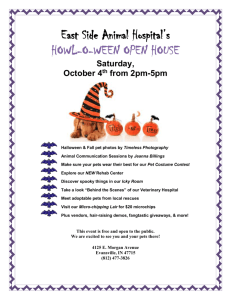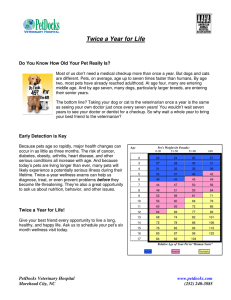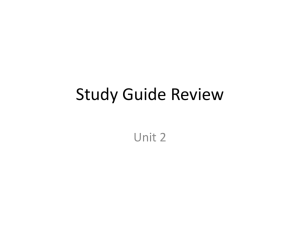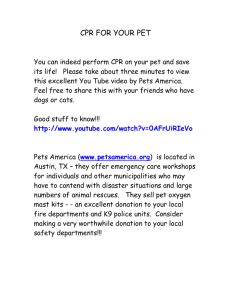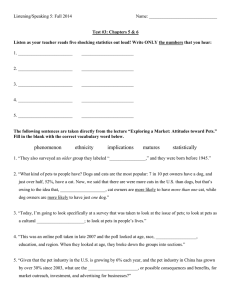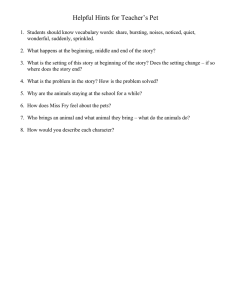here. - Thames Valley Housing
advertisement
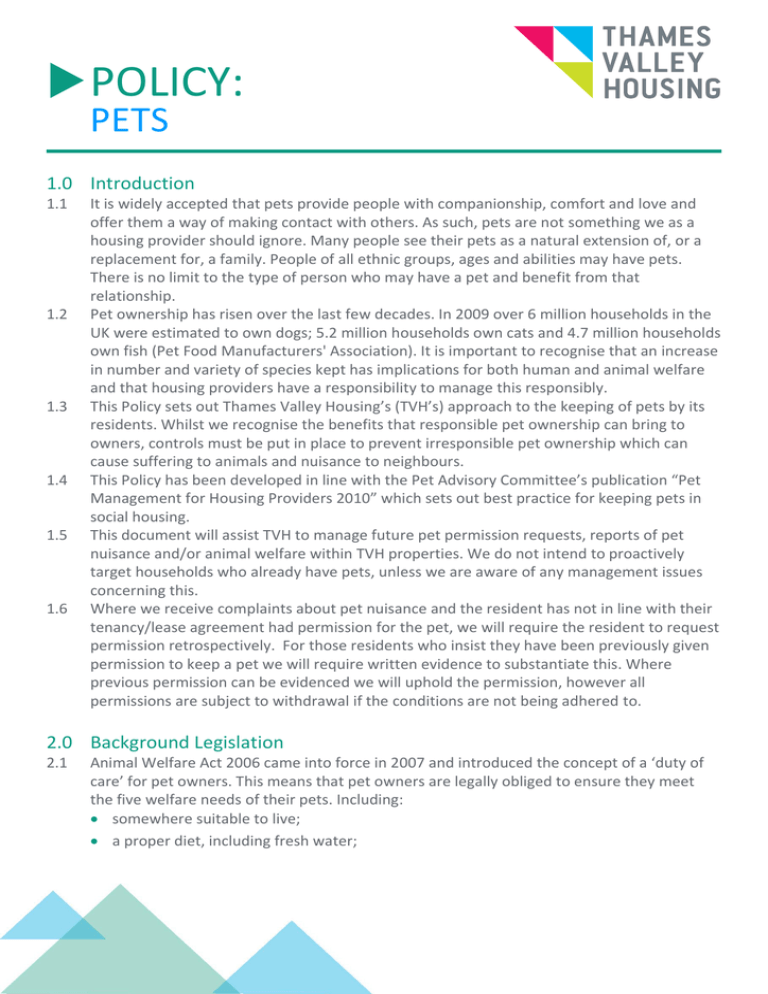
POLICY: PETS 1.0 Introduction 1.1 1.2 1.3 1.4 1.5 1.6 It is widely accepted that pets provide people with companionship, comfort and love and offer them a way of making contact with others. As such, pets are not something we as a housing provider should ignore. Many people see their pets as a natural extension of, or a replacement for, a family. People of all ethnic groups, ages and abilities may have pets. There is no limit to the type of person who may have a pet and benefit from that relationship. Pet ownership has risen over the last few decades. In 2009 over 6 million households in the UK were estimated to own dogs; 5.2 million households own cats and 4.7 million households own fish (Pet Food Manufacturers' Association). It is important to recognise that an increase in number and variety of species kept has implications for both human and animal welfare and that housing providers have a responsibility to manage this responsibly. This Policy sets out Thames Valley Housing’s (TVH’s) approach to the keeping of pets by its residents. Whilst we recognise the benefits that responsible pet ownership can bring to owners, controls must be put in place to prevent irresponsible pet ownership which can cause suffering to animals and nuisance to neighbours. This Policy has been developed in line with the Pet Advisory Committee’s publication “Pet Management for Housing Providers 2010” which sets out best practice for keeping pets in social housing. This document will assist TVH to manage future pet permission requests, reports of pet nuisance and/or animal welfare within TVH properties. We do not intend to proactively target households who already have pets, unless we are aware of any management issues concerning this. Where we receive complaints about pet nuisance and the resident has not in line with their tenancy/lease agreement had permission for the pet, we will require the resident to request permission retrospectively. For those residents who insist they have been previously given permission to keep a pet we will require written evidence to substantiate this. Where previous permission can be evidenced we will uphold the permission, however all permissions are subject to withdrawal if the conditions are not being adhered to. 2.0 Background Legislation 2.1 Animal Welfare Act 2006 came into force in 2007 and introduced the concept of a ‘duty of care’ for pet owners. This means that pet owners are legally obliged to ensure they meet the five welfare needs of their pets. Including: somewhere suitable to live; a proper diet, including fresh water; 2.2 2.3 2.4 the ability to express normal behaviour; for any need to be housing with, or apart from, other animals; and protection from, and treatment of, illness and injury. Dangerous Dogs Act 1991 Section 1 of the Act made it an offence to keep specific breeds of dogs, and must be taken into account when granting permission for a resident to keep a dog. The following types of dog are prohibited - Pit Bull Terrier, Dogo Argentino, Fila Braziliero and Japanese Tosa. Section 3, affects all dogs regardless of breed or type. It makes it a criminal offence to allow a dog to be dangerously out of control in a public place. This includes any instance during which an injury of any sort occurs or there is a fear that an injury might occur. Dangerous Wild Animals Act 1976 aims to ensure that where individuals keep dangerous wild animals they do so in circumstances which create no risk to the public and safeguard the welfare of the animals. Licenses are required from the local authority for any animal which appears on a Schedule of the Act. Disability Discrimination Act 2005. Assistance dogs – such as guide dogs for blind people, hearing dogs for deaf people or dogs for disabled people – must always be permitted. The Disability Discrimination Act 2005 (DDA) prohibits anyone renting or selling a property from discriminating against a disabled person, this includes discriminating against a person with an assistance dog. The Equality Act 2010 also ensures people with disabilities have the same right to and access to services as everyone else. 3.0 TVH’s Approach to Pets in Properties (Tenants) 3.1 All versions of TVH’s tenancy agreements contain very clear clauses on keeping pets. The clauses relating to pet ownership in the latest version of the Probationary Tenancy (which is not amended when it becomes an Assured Tenancy) specifies that the Tenant agrees: In point 3.10(i) “Not to keep any animal (including any bird or reptile) at the Premises without the written consent of the Association (such consent not to be unreasonably withheld). (ii) To keep under control any animal (including any bird or reptile) kept at the Premises and not to allow any such animal to cause a nuisance or annoyance to residents of any neighbouring properties, or of other properties in the locality. (iii) Any consent granted by the Association under paragraph (i) above may be conditional and may be withdrawn at any time if the Association reasonably believes that the tenant is not complying with paragraph (ii) above or with any condition on which the consent was granted.” In point 3.4“To obtain the written consent of the Association (such consent not to be unreasonably withheld) before operating a business at the Premises”- this would include breeding animals for sale or dog walking/home-boarding, all of which would be prohibited. 4.0 TVH’s Approach to Pets in Properties (Homeowners) 4.1 4.2 4.3 4.4 Whilst individual and specific Lease requirements will be considered, the standard TVH’s Leasehold Tenancy agreement contains the following clause regarding pets: “No bird, fowl, dog, cat or other creature shall be kept in the Premises other than with the written permission of the Landlord.” All requests for permission are subject to a £50 administration fee and may be more if this is permission is required from a management company/agent. All consent or permissions given are subject to review and may be withdrawn at any time by TVH. Freeholders are not bound by a lease agreement and are therefore exempt from this Policy. 5.0 Policy Conditions 5.1 In line with the terms of the individual Tenancy/Lease agreement all residents must seek permission to keep pets in ALL circumstances. This will allow TVH to: Assess whether permission can be granted Record what animals are being kept To issue the resident with a standard agreements in pet ownership To remind the resident of the terms of their tenancy/lease agreement in relation to keeping pets 6.0 New applications 6.1 6.2 6.3 6.4 6.5 6.6 Permission will only be given after the type of animal and its size has been taken into consideration together with the type of property the resident lives in. For dogs or cats, if the resident has direct access to their own garden, we will normally give permission. Permission will not be given where the only garden is communal. TVH will not state a definitive number of pets that are allowed in a home but as a general rule, no more than two animals per home will be allowed. Any exceptions to this must be agreed with the Area Housing Manager/Homeownership Manager who will take into account a variety of factors including the type and size of animals. TVH recognises that in some cases a pet may be the only companion a resident may have, therefore there may be some exceptional circumstances where permission is given outside of the Policy. However it may be withheld or withdrawn if there is a health risk or nuisance to other residents. TVH will agree to the keeping of guide or other assistance dogs for residents with disabilities. All permissions are subject to behaviour rules. It is important to note that where TVH has developed property in conjunction with other registered providers or are parties to a head lease agreement it may be that a “no pets” policy applies. In such a situation, TVH must abide by the terms of this agreement. 6.7 6.8 Permission will not be granted where there is an on going problem with nuisance or another breach of tenancy or where there has been a problem in the past with pets (see section below on reasons for refusal). Resident’s who wish to temporarily look after pets in their home must still apply for permission in writing. 7.0 Retrospective Permission 7.1 In line with the Introduction we do not intend to proactively target households who already have pets, unless we are aware of any management issues concerning this. Where historical permission has already been given and can be evidenced, TVH will uphold the permission. All historical and new permissions are subject to behaviour rules which if broken will lead to enforcement action. 8.0 Acceptable Pets 8.1 8.2 Permission will normally be granted to small domestic animals e.g. hamsters, small birds and fish, although there will be a restriction of the maximum number of pets allowed. We will also consider granting permission for the following types of pet: If you Live in…. A House or Bungalow Maximum number of pets Two dogs or two cats or one cat and one dog One cat or one dog A flat with a private entrance * and garden * A private entrance means that you can access your flat from the street without going through any communal gardens, walkways or corridors. 8.3 8.4 Permission will not be granted for the following: Dogs specified in the Dangerous Dogs Act 1991 Farm animals including chickens, ducks, sheep, goats, horses, pigs and cattle Animals registered under the Dangerous Wild Animals Act 1976 In accordance with the table above the number or type of pet is not suitable for your home Whilst not limited to the reasons stated below TVH may also refuse permission on the following grounds: Where residents already have the permitted number of pets in ownership A previous history of pet nuisance or anti social behaviour A previous history of animal welfare issues The condition of your home means that it is not suitable for a pet The pet is pregnant Planning/Lease restrictions prohibit the request 9.0 Responsibility 9.1 9.2 9.3 9.4 Residents are responsible for the health and safety of their pets. Under the Animal Welfare Act 2006, this is called a duty of care. This requires proper day to day management and care of the pet. Any concerns regarding neglect or mistreatment should be reported to the RSPCA on 0300 1234 999. The control of pets and any pets visiting the property are the responsibility of the residents. If cats are allowed free access outside then it is the resident’s responsibility to ensure that they do not cause a nuisance to neighbours. Dog faeces must always be removed immediately. We will recharge individual residents for clearing dog faeces where we have evidence to support this. If a resident wishes to construct a cat flap or outside accommodation for their pet they must first seek written permission from TVH. If a resident has already installed a cat flap without the appropriate permission, they must require this retrospectively. No pet should be left in a property when the resident is away unless clear arrangements have been made to provide adequate care. 10.0 Unauthorised Pets 10.1 TVH may be forced to take action in cases where residents take in a pet without having obtained permission. Enforcement action may include: Requiring the residents to re-home the pet Refusing a transfer until the matter is resolved Involving agencies such as the Police, Local Authority or RSPCA Refusing to convert a probationary tenancy at the 12 month review Obtaining an Injunction Legal action to obtain a Possession Order Eviction in the most serious cases 10.2 In all cases we will do our best to work with the resident to try and find a resolution to the situation to avoid enforcement action if possible. 11.0 Enforcement Action 11.1 In cases where a breach of tenancy/lease occurs as a result of a resident keeping a pet and the resident is not making any effort to address the problems reported we will have to resort to the enforcement actions detailed above. 11.2 Examples of what is considered a breach of tenancy/lease include: Pets fouling communal or individual gardens which is not being cleared up immediately Pets should not be allowed to access communal areas internally or externally without supervision and without being kept on a lead Distressed animals Excessive noise from pets Pets left alone in a property Too many animals within a household Unpleasant odours due to pets Damage caused to TVH property by the pet Breeding of pets Aggressive animals causing distress to other residents or animals Pets fouling in neighbours gardens 11.3 The list above is not an exhaustive list. 11.4 In some cases it may be appropriate to consider mediation rather than legal action. 11.5 Any costs incurred by TVH in relation to enforcement action will be passed on to the resident. 12.0 Requesting Permission 12.1 Permission for a pet should be requested in writing using the letter and application form attached (Appendix A) providing full details and completing all sections of the form. Residents must wait for a full response before getting a pet. It is important that residents do not assume that permission will be granted. 13.0 Decision & Appeals Process 13.1 The Housing Officer or Property Manager should consider the request in line with the Policy and by referring to the Pet Advisory Committee’s Guidelines on Pet Management for Housing Providers 2010 (attached). 13.2 A response must be sent in writing to the resident within 10 working days indicating whether or not consent will be given and advising them of their right to appeal if permission is not granted (Appendix B). 13.3 Residents may appeal in writing to the Deputy Housing Director/Assistant Director of Homeownership within five working days of receiving the decision letter. If necessary a meeting will be arranged at a suitable venue or the resident’s home to discuss the appeal. 13.4 A full response to the appeal will be sent in writing within ten working days following receipt of the appeal. 14.0 Withdrawing Permission 14.1 If a decision is taken to withdraw permission to have a pet this must be done in writing, stating the reasons. A right of appeal must also be given. 15.0 Useful links 15.1 The TVH Tenancy Policy. 16.0 Equality Impact Assessment 16.1 The Equality Impact Assessment showed a potential adverse impact on residents with disabilities or vulnerabilities. There is a clause in the Policy to grant permission in what may be considered ‘exceptional’ circumstances, in which case permission for Assistance Pets and Guide Dogs will be given. Other residents who may be considered vulnerable will be supported to re-home their pets. 17.0 Policy Information Policy owner: Area Housing Manager Approved by: Deputy Director of Housing Last review date: November 2013 Next review date: November 2016 Equality assessment: November 2013 Resident consultation completed: N/a
